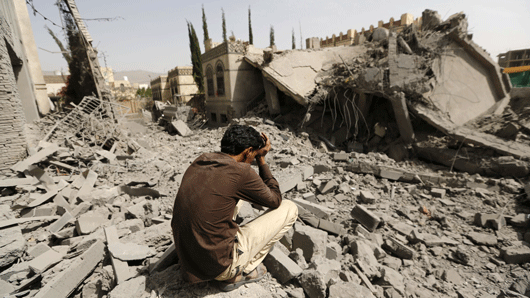
BY Alan Lima de Pereira
It is nearing midnight on a chilly and beautiful January night in Yemen. The hum of the hospital generator outside my window, overlaid with the sound of gunfire (sometimes celebratory, sometimes not), is something I have grown used to over the past three months.
My phone rings: it is the duty doctor calling for back-up after receiving multiple gunshot patients in the emergency room of Al Nasser general hospital in Al Dhale governorate.
My heart doesn’t race like it used to. From never seeing gunshot wounds back home in India, to now seeing them on a daily basis, I am learning a lot here in Yemen. This night is busier than most.
One patient has had his left eye socket blown out by a bullet and is still talking coherently - it is like a scene from a movie. Another has a gunshot wound to the head and is being mechanically ventilated, while a third has multiple gunshots through his abdomen. Our medical team manages these patients calmly and efficiently. Later the staff joke with me about how, in the middle of last year, when the frontline was at their doorstep, this was daily life for them.
The resilience of people here is something I will always admire. Rabia, one of our cleaners, goes about her daily routine with a smile. Not for a second would you guess that she has lost all three of her sons in the war. Larger-than-life billboards of their handsome faces rise over the streets, along with the images of many others who have lost their lives.
War wounds aren’t the only medical needs we have to tackle. Yemen is grappling with a dual burden: malnutrition and vaccine-preventable diseases on the one hand, chronic conditions like heart disease and strokes on the other. Mental health issues are completely ignored. Due to the war and uncontrolled inflation, healthcare is either unavailable or inaccessible to large parts of the population.
There are severe shortages of fuel, food, electricity and water, too.
These are times when international humanitarian law is just another meaningless phrase. The indiscriminate attacks on hospitals and civilians - either targeted or conveniently labelled collateral damage - add an extra layer of complexity. It sometimes makes us question whether what we are doing here in Yemen is worth the risks we take. It is a question to which the answer is obvious from the outset; a question that we should never have been forced to ask ourselves, knowing how grave the humanitarian needs are.
The moments of helplessness faced by a wartime doctor are many. We know there will always be another flood of patients pouring into our hospital. This is yet another forgotten war where the most helpless and innocent are the most affected.
Then there are the little victories and small joys that make our so-called career choice seem worthwhile: sharing a meal with 200 men at the local sheikh’s house; working with an amazing team of Yemeni staff who poke fun at me and my attempts to learn Arabic; discussing the Bollywood movies that make men cry without fail.
I will never forget one little girl who came in with a severe chest infection and whose mother had all but given her up for dead. We used all our persuasive powers to convince the mother to let us continue treatment for a little while longer. A week later, the mother walked out of the hospital with her smiling, playful infant in her arms. Her sheepish grin was all the thanks we needed.
I now leave Yemen with a heavy heart. It has definitely been one of my most challenging experiences: dire needs for healthcare in the face of insecurity.
My hope and prayer is that this war will end soon. If that is asking too much, until then, may humanitarian assistance reach every person who needs it in this breathtaking country.
Sources: The Guardian, Edited by Website Team